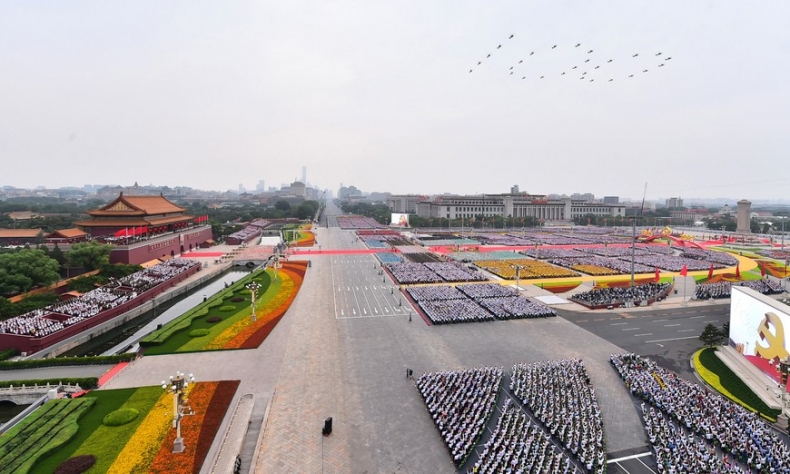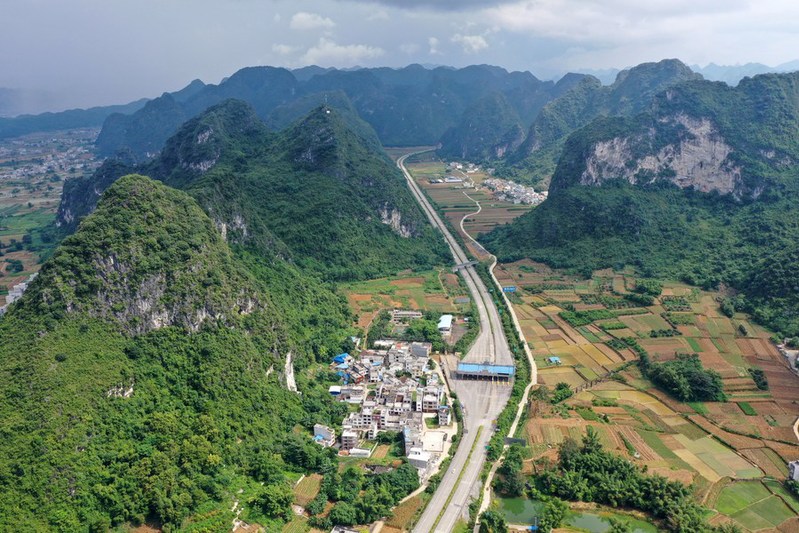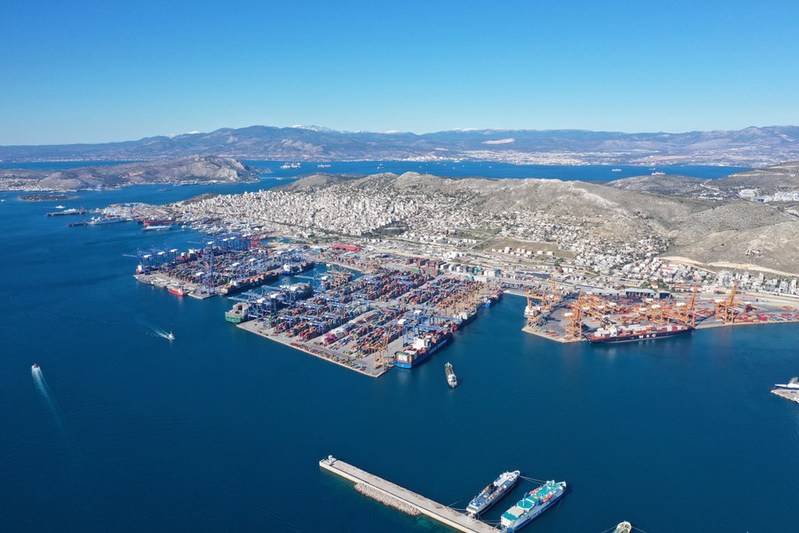
Koh King Kee
Koh King Kee is President of ASEAN Research Center for a Community with Shared Future,President of Centre for New Inclusive Asia and Malaysia.
As the Communist Party of China (CPC) celebrates the centenary of its founding on July 1, the song “Without the Communist Party, There Would Be No New China” has been reverberating across China, in the streets, theaters and even up in the sky as the theme song for drone light shows.
Without the Communist Party, there would be no New China.
Without the Communist Party, there would be no New China.
The Communist Party toiled for the nation.
The Communist Party of one -mind saved China.
It pointed to the road of liberation for the people.
It led China towards the light.
It supported the War of Resistance for more than eight years.
It has improved people’s lives.
It built a base behind enemy lines.
It practiced democracy, bringing many advantages.
Without the Communist Party, there would be no New China.
Without the Communist Party, there would be no New China!
The lyrics of the song was written by a 19-year Communist Party member, Cao Huoxing, in October 1943 based on a Liberation Daily’s editorial published on August 25, 1943, entitled “Without the Communist Party there would be no China”.
In 1950, Chairman Mao Zedong added the word “new” to the lyrics, thus changing the title of the song to “Without the Communist Party, There Would Be No New China”. It has since remained as one of the most popular revolutionary songs in China, often sang during major national celebrations.
As CPC turns 100, the song is being sang, often spontaneously, by the Chinese people in deep appreciation of CPC’s struggles and sacrifices for the people and the nation over the century.
There would indeed be no New China without the Communist Party!

A ceremony marking the centenary of the Communist Party of China (CPC) is held at Tian’anmen Square in Beijing, capital of China, July 1, 2021. (PHoto/Xinhua)
A party for the people
CPC was founded by a small group of intellectuals a century ago, at a tumultuous time when China was at the brink of being balkanized by warlords, Japan and Western colonial powers. CPC has remained true to its original aspirations of seeking a better life and happiness for the people and the rejuvenation of the Chinese nation. Over the past 100 years, it has relentlessly strived to fulfill its founding mission.
As CPC celebrates its 100th birthday on July 1, it has plenty to be proud of.
“The Chinese people have stood up”, declared Chairman Mao at the Tiananmen Square as he proclaimed the founding of the People’s Republic of China to the world on October 1, 1949, after winning the Liberation War against the Kuomintang.
As a people-centered party, the new regime wasted no time in reestablishing the war-torn social order and rebuilding the broken economy, prioritizing on improving education and healthcare of the people. CPC embarked on a massive campaign to eradicate illiteracy and successfully reduced China’s illiteracy rate from 80 percent in 1949 to 2.67 percent in 2020. During the same period, Chinese life expectancy has more than doubled, from 35 years to 77 years, due to improvement in the overall standard of living and healthcare.
CPC started the Reform and Opening Up policy in 1978, opening its doors to the outside world and embracing market economy. As CPC abandoned the archaic command economy, farmers were allowed to contract and manage the farmland, private businesses flourished, foreign investments poured in and exports soared. As a result, China leapfrogged to become the second largest economy of the world within a short span of less than 40 years. It is dubbed “factory of the world” with the most complete and efficient manufacturing ecosystem critical to the global supply chain, and is the main trading partner of more than 130 countries in the world.
China’s GDP, which exceeded 100 trillion yuan ($15.5 trillion) for the first time in 2020, grew by 189 times over the past 70 years since the founding of the People’s Republic of China. It now accounts for 17 percent of the global GDP, consistently contributing about 30 percent to global growth during the past 10 years before the COVID-19 pandemic.
Under CPC’s leadership, China lifted more than 770 million people from poverty since its reform and opening up in late 1970s, and for the first time completely eradicated extreme poverty in the history of China. According to the World Bank, this figure accounted for more than 70 percent of the global total over the same period.
The people-centered governance philosophy is the fundamental driving force behind CPC’s cause in poverty alleviation. “Since its founding, the CPC has always taken the happiness of the people and rejuvenation of the nation as its aspiration,” according to a white paper titled Poverty Alleviation: China’s Experience and Contribution released on April 21, 2021.
As President Xi Jinping declared at a ceremony marking the centenary of CPC in Beijing on July 1, China has “realized the first centenary goal of building a moderately prosperous society in all respects.”
“This means that we have brought about a historic resolution to the problem of absolute poverty in China, and we are now marching in confident strides toward the second centenary goal of building China into a great modern socialist country in all respects,” President Xi said.
China’s success in its battle against the COVID-19 pandemic is yet another manifestation of CPC’s people-centered governance philosophy. CPC put people’s life, safety and health above anything else as the unwavering guiding principle of China’s fight against the coronavirus. President Xi repeatedly pointed out that saving as many lives as possible, by every possible means, must be the number one priority.
China adopted a whole-of-nation approach with swift rollout of stringent and thorough measures to stop the spread of the virus. Wuhan was locked down before the traditional Spring Festival and over 40,000 medical workers from across the country came to Wuhan and built mobile cabin hospitals in weeks to quarantine and treat COVID-19 patients. With the people and government in one heart, China effectively contained the virus in less than three months and reduced the COVID-19 fatality rate.
CPC owed its existence to the people and legitimized its leadership because it constantly and persistently puts people’s interest above all. “Serving the People” calligraphed by Chairman Mao remains the motto and philosophy of CPC’s governance, since the founding of People’s Republic of China (PRC) in 1949.

Aerial photo taken on July 23, 2019 shows a section of Lanzhou-Haikou Expressway in Du’an Yao Autonomous County, south China’s Guangxi Zhuang Autonomous Region. (Photo/Xinhua)
A party for global peace and prosperity
CPC’s people-oriented philosophy is also well manifested in China’s foreign policy and its proposal on global governance.
China upholds the UN Charter and the multilateral institutions which are pillars of the current world order. China recognizes that its growth has been realized within the existing international order and has made significant contribution to world peace. It takes lead in UN peacekeeping by contributing about 15 percent of UN peacekeeping budget and provides most peacekeepers among five permanent members of UN Security Council.
As the second largest economy of the world, China is the main power house of global growth and an important anchor in maintaining world economic order. During the 2008 Global Financial Crisis, China helped Asia weather the storm with a 4-trillion-yuan stimulus package. The world is now again counting on China in expediting the post pandemic economic recovery.
China benefits from globalization and the multilateral trade regime. China’s mammoth transcontinental development initiative, the Belt and Road Initiative (BRI), is its offer of global public good as a rising economic power. It is a manifestation of CPC’s people-oriented philosophy on the global level.
Through BRI, China hopes to “build a new platform for international co-operation to create new drivers of shared development,” said President Xi at the 19th CPC National Congress.
According to a 2019 World Bank study, if fully implemented, BRI transport projects could increase trade between 1.7 and 6.2 percent for the world, increase global real income by 0.7 to 2.9 percent and lift 8.7 million people from extreme poverty and 32 million people from moderate poverty globally.
A Community with Shared Future for Mankind is China’s concept for global governance for a fair, equitable and just global order, built upon the spirit of openness, inclusiveness, mutual respect and love for Mother Earth. It is China’s answer to the call of the time of the world beset by a myriad of global challenges and risks such as terrorism, slow growth, climate change and protectionism.
The concept is a manifestation of China’s foreign policy goal of peace, equality, development and win-win cooperation. As the Confucius saying goes: “All men are brothers within the four seas.” China treats all countries, big and small, near and afar, as equals.
China’s development has been possible because of the world, and China has contributed to the world’s development.
“We will work to build a new type of international relations and a human community with a shared future, promote high-quality development of the Belt and Road Initiative through joint efforts, and use China’s new achievements in development to provide the world with new opportunities,” President Xi said at a ceremony marking the centenary of CPC in Beijing on July 1.
The concept of a Community with Shared Future for Mankind is thus CPC’s internationalism in the new era with Chinese characteristics, enshrined in CPC’s constitution and included in the preambles of PRC’s constitution.

Aerial photo taken on Jan. 16, 2019 shows the Piraeus port in Greece. (Photo/Xinhua)
Concluding remarks
China stands tall in the world as CPC celebrates its centennial.
With a per capita GDP of $11,221, China is at the verge of joining the ranks of high-income society and its GDP expected to outsize the US in less than a decade. As China becomes more prosperous, more than 150 million Chinese tourists travel all over the world annually and hundreds of thousands of Chinese students attend the best schools that parents of other countries can only hope for.
China’s infrastructure, with its ultra-modern high-speed rail crisscrossing the country and paved roads linking up the remotest villages, is the envy of the world. Its roaring dams and huge solar farms are producing plentiful of clean energy, as China promised the world that it would achieve carbon neutrality by 2060.
China leads in 5G technology and digital economy. It is at the advanced stage of rolling out the digital Yuan.
Hence, as China confidently marches towards becoming an advanced, strong and prosperous nation, the Chinese people have good reasons to sing aloud, gratefully: “Without the Communist Party, There would Be No New China.”
Originally published on China Focus, please view at
http://www.cnfocus.com/without-the-communist-party-there-would-be-no-new-china/
